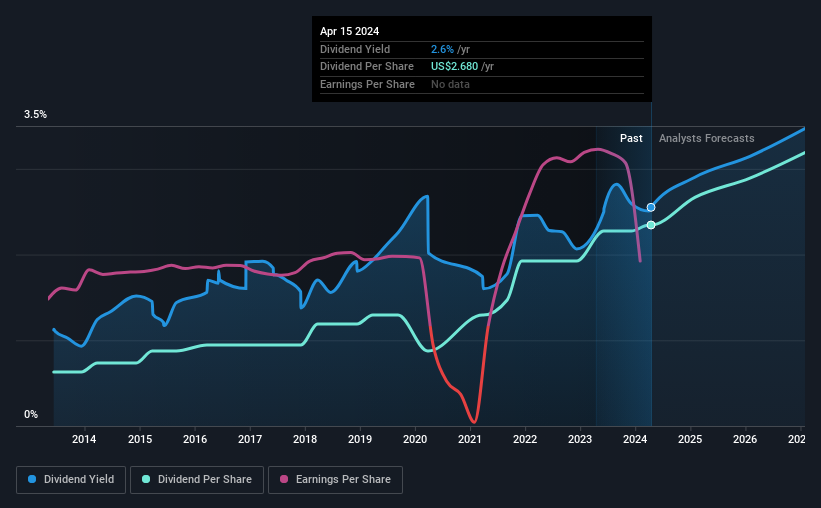Oxford Industries (NYSE:OXM) Has Announced That It Will Be Increasing Its Dividend To $0.67
Oxford Industries, Inc.'s (NYSE:OXM) dividend will be increasing from last year's payment of the same period to $0.67 on 3rd of May. This will take the annual payment to 2.6% of the stock price, which is above what most companies in the industry pay.
Check out our latest analysis for Oxford Industries
Oxford Industries' Payment Has Solid Earnings Coverage
We like to see robust dividend yields, but that doesn't matter if the payment isn't sustainable. The last dividend was quite easily covered by Oxford Industries' earnings. This means that a large portion of its earnings are being retained to grow the business.
The next year is set to see EPS grow by 180.6%. If the dividend continues on this path, the payout ratio could be 27% by next year, which we think can be pretty sustainable going forward.
Dividend Volatility
The company's dividend history has been marked by instability, with at least one cut in the last 10 years. The dividend has gone from an annual total of $0.72 in 2014 to the most recent total annual payment of $2.68. This means that it has been growing its distributions at 14% per annum over that time. Dividends have grown rapidly over this time, but with cuts in the past we are not certain that this stock will be a reliable source of income in the future.
Oxford Industries May Find It Hard To Grow The Dividend
Growing earnings per share could be a mitigating factor when considering the past fluctuations in the dividend. Unfortunately, Oxford Industries' earnings per share has been essentially flat over the past five years, which means the dividend may not be increased each year.
Our Thoughts On Oxford Industries' Dividend
Overall, this is probably not a great income stock, even though the dividend is being raised at the moment. In the past, the payments have been unstable, but over the short term the dividend could be reliable, with the company generating enough cash to cover it. We don't think Oxford Industries is a great stock to add to your portfolio if income is your focus.
It's important to note that companies having a consistent dividend policy will generate greater investor confidence than those having an erratic one. At the same time, there are other factors our readers should be conscious of before pouring capital into a stock. As an example, we've identified 4 warning signs for Oxford Industries that you should be aware of before investing. Is Oxford Industries not quite the opportunity you were looking for? Why not check out our selection of top dividend stocks.
Have feedback on this article? Concerned about the content? Get in touch with us directly. Alternatively, email editorial-team (at) simplywallst.com.
This article by Simply Wall St is general in nature. We provide commentary based on historical data and analyst forecasts only using an unbiased methodology and our articles are not intended to be financial advice. It does not constitute a recommendation to buy or sell any stock, and does not take account of your objectives, or your financial situation. We aim to bring you long-term focused analysis driven by fundamental data. Note that our analysis may not factor in the latest price-sensitive company announcements or qualitative material. Simply Wall St has no position in any stocks mentioned.

 Yahoo Finance
Yahoo Finance 
